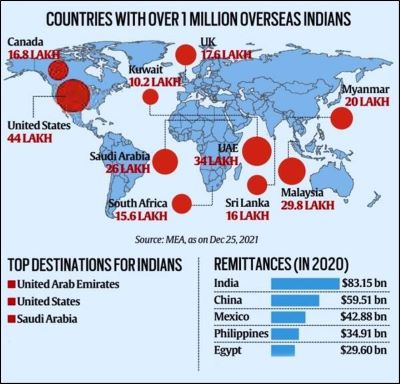Context-
India proudly boasts one of the largest and most successful diasporas globally, comprising nearly 35 million individuals. This diaspora includes Non-Resident Indians (NRIs) and Persons of Indian Origin (PIOs or OCIs) who have attained citizenship in other countries.
The Significance of India’s Diaspora
From blue-collar workers to CEOs of multinational corporations, they contribute significantly to their adopted countries while maintaining connections with their Indian heritage. India considers its diaspora a strategic asset and a vital bridge between nations.
● Diaspora Diplomacy and Evacuation Missions: India's diaspora diplomacy, coupled with exceptional outreach efforts, has been instrumental in ensuring the safety of its citizens abroad. Prime Minister Modi's leadership has bolstered India's relations with numerous countries, facilitating swift evacuations during crises. The Indian government's proactive stance in evacuating citizens from conflict zones has garnered international acclaim, positioning India as a leader in humanitarian assistance. Under the guidance of leaders like the late Sushma Swaraj, Indian missions abroad have become havens for the Indian community, providing assistance and support during emergencies.
● Challenges Posed by Extremist Groups: Despite the diaspora's significant contributions, challenges arise from extremist and separatist groups, particularly in Western countries and neighboring regions. These groups aim to destabilize India and undermine its security interests, often with support from their host countries' authorities. Instances of individuals obtaining citizenship under the pretenses of pursuing anti-India agendas highlight the complexities of diaspora management.
Addressing these challenges requires a multifaceted approach, including diplomatic efforts to expose and counteract the influence of such groups, even if it strains bilateral relations with certain nations.
Practical Difficulties Faced by the Diaspora
While India's diaspora enhances its global presence, practical difficulties arise, particularly concerning the working-class NRI population. Instances of Indians voluntarily venturing into conflict zones, such as Russia and Israel, pose significant challenges for the Indian government in ensuring their safety and repatriation.
● Risks of Working in Conflict Zones: Despite warnings and advisories, Indian workers often seek employment in conflict-prone regions like Russia and Israel, driven by economic prospects. However, their presence in such areas heightens the risk of harm, as seen in conflict casualties. The Indian government faces the arduous task of managing evacuations and safeguarding its citizens amidst escalating tensions.
● Need for Regulatory Oversight and Enforcement: The recruitment process for overseas employment requires stringent oversight to prevent exploitation and ensure the safety of Indian workers. Cases of illegal recruitment and inadequate preparation for working in volatile regions underscore the need for robust regulatory mechanisms. Government agencies must collaborate to monitor recruitment practices, penalize offenders, and provide adequate training and support for outbound workers.
Government Response and Evacuation Efforts
In response to escalating conflicts and crises, the Indian government implements evacuation missions to safeguard its citizens abroad. These efforts involve coordination between diplomatic missions, government agencies, and international partners to ensure timely and secure repatriation.
Strategic Evacuation Planning: India's experience conducting evacuation missions, such as Operation "Ajay" in Israel, demonstrates the government's proactive approach to crisis management. Collaborative efforts between Indian missions, host governments, and private entities enable swift evacuations, mitigating risks to Indian nationals stranded in conflict zones.
Challenges in Crisis Management: Despite meticulous planning, crisis management poses inherent challenges, especially in volatile regions like the Middle East. The sheer number of Indian expatriates in Gulf and West Asian countries amplifies the complexity of evacuation operations. The government's priority lies in minimizing risks to its citizens while navigating geopolitical tensions and logistical constraints.
Lessons Learned and Future Preparedness
India's experience managing diaspora-related challenges underscores the importance of continuous preparedness and proactive measures. By learning from past incidents and enhancing coordination among stakeholders, the government can mitigate risks and safeguard the welfare of its citizens abroad.
● Enhancing Outreach and Awareness: Promoting awareness among the diaspora about potential risks and advisories is crucial in preventing avoidable crises. Through targeted communication and engagement initiatives, the government can empower Indian nationals to make informed decisions regarding overseas employment and travel.
● Strengthening Regulatory Frameworks: Strengthening regulatory frameworks governing overseas recruitment and employment is imperative to safeguard the rights and safety of Indian workers. Collaborative efforts between government agencies, industry stakeholders, and civil society organizations can enhance oversight and enforcement mechanisms, reducing vulnerabilities in the diaspora.
Conclusion
In conclusion, India's diaspora constitutes a valuable asset, contributing to the nation's global influence and economic prosperity. However, effectively managing diaspora-related challenges requires a comprehensive approach encompassing diplomacy, crisis management, and regulatory reforms. By prioritizing the welfare of its citizens abroad and fostering partnerships with international stakeholders, India can navigate complex geopolitical landscapes and uphold its commitment to safeguarding the diaspora's interests.
|
Probable Questions for UPSC Mains Exam- 1. Assess the significance of India's diaspora in global affairs, emphasizing the contributions of NRIs and PIOs to the nation's economic growth and diplomatic relations. Evaluate the effectiveness of diaspora diplomacy in ensuring the safety of Indian citizens abroad. (10 marks, 150 Words) 2. Examine the challenges posed by extremist groups within India's diaspora and their impact on national security. Discuss the role of diplomatic efforts in addressing these challenges and regulating recruitment practices to safeguard Indian workers overseas. (15 marks, 250 words) |
Source- VIF







